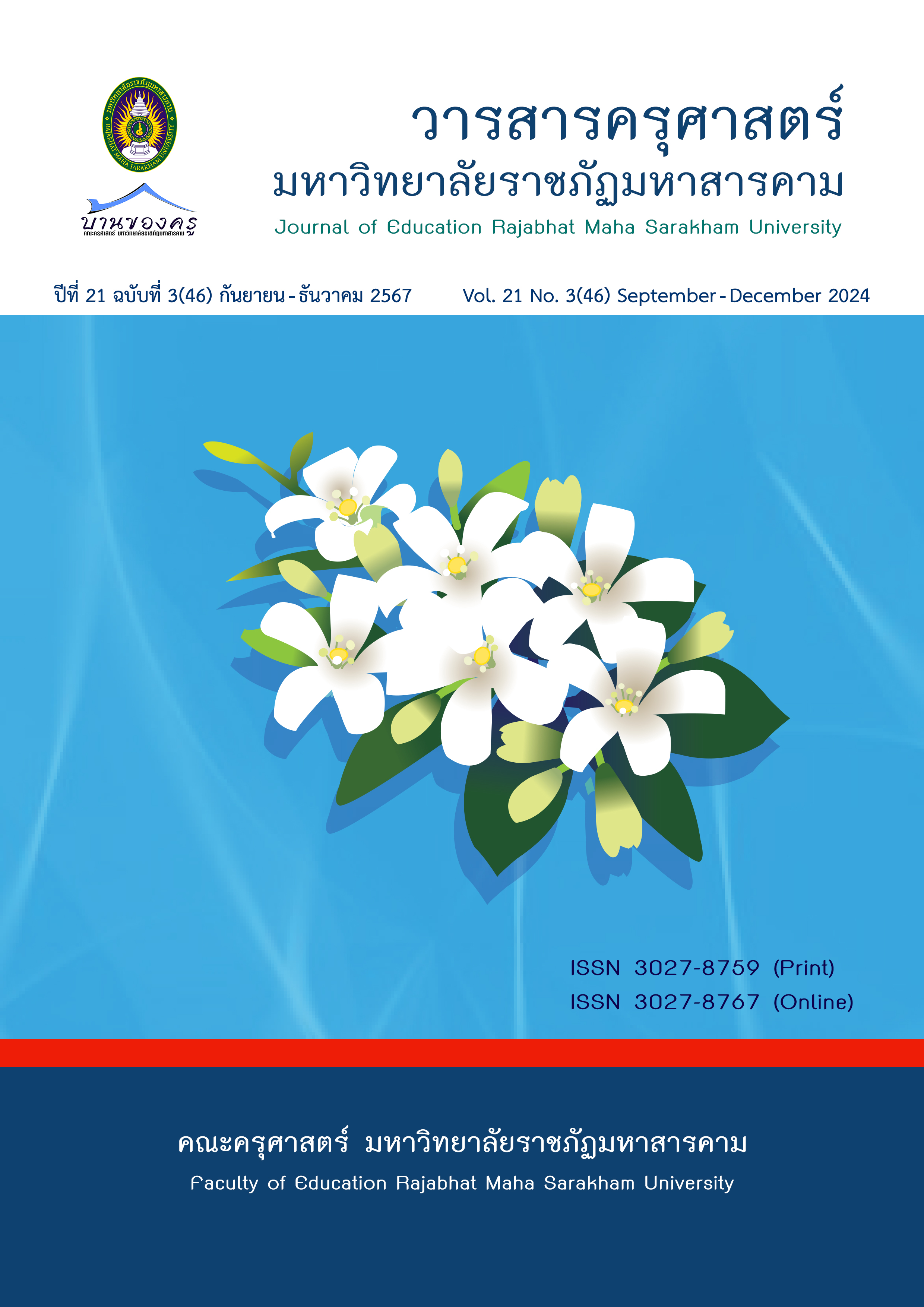แนวทางการพัฒนาภาวะผู้นำเชิงนวัตกรรมของผู้บริหารสถานศึกษา สังกัดสำนักงานเขตพื้นที่การศึกษาในจังหวัดร้อยเอ็ด
Main Article Content
บทคัดย่อ
การวิจัยครั้งนี้มีวัตถุประสงค์เพื่อ 1) ศึกษาสภาพปัจจุบัน สภาพที่พึงประสงค์ และความต้องการจำเป็นของภาวะผู้นำเชิงนวัตกรรมของผู้บริหารสถานศึกษา และ 2) ศึกษาแนวทางพัฒนาภาวะผู้นำเชิงนวัตกรรมของผู้บริหารสถานศึกษา กลุ่มตัวอย่างในการวิจัยครั้งนี้ คือ ผู้บริหารสถานศึกษาและครู จำนวน 372 คน ตามตารางเครจซี่และมอร์แกน กลุ่มผู้ให้ข้อมูลหลักเป็นผู้ทรงคุณวุฒิด้านนวัตกรรมการบริหารสถานศึกษา จำนวน 5 คน เครื่องมือที่ใช้ในการวิจัย ประกอบด้วย แบบสอบถามสภาพปัจจุบัน มีค่าความเชื่อมั่น เท่ากับ 0.96 และแบบสอบถามสภาพที่พึงประสงค์ มีค่าความเชื่อมั่น เท่ากับ 0.98 แบบสัมภาษณ์เป็นแบบมีโครงสร้าง สถิติที่ใช้ในการวิจัย ได้แก่ ค่าเฉลี่ย ส่วนเบี่ยงเบนมาตรฐาน และค่าดัชนีความต้องการจำเป็น
ผลการวิจัยพบว่า 1) สภาพปัจจุบันโดยรวมและรายด้านอยู่ในระดับปานกลาง สภาพที่พึงประสงค์โดยรวมและรายด้านอยู่ในระดับมากที่สุด ค่าความต้องการจำเป็นสูงที่สุด คือ ด้านการมีวิสัยทัศน์เชิงนวัตกรรม 2) แนวทางการพัฒนาภาวะผู้นำเชิงนวัตกรรมของผู้บริหารสถานศึกษามีทั้งหมด 42 แนวทาง จากนั้นจัดทำเป็นคู่มือการพัฒนาภาวะผู้นำเชิงนวัตกรรมของผู้บริหารสถานศึกษา ประกอบด้วย หลักการและเหตุผล วัตถุประสงค์ โครงสร้างหลักสูตร วิธีการพัฒนา และการวัดและประเมินผล ซึ่งผลการประเมินแนวทางการพัฒนาและคู่มือการพัฒนาภาวะผู้นำเชิงนวัตกรรมของผู้บริหารสถานศึกษา โดยรวมมีความเหมาะสมและความเป็นไปได้อยู่ในระดับมากที่สุด
Article Details

อนุญาตภายใต้เงื่อนไข Creative Commons Attribution-NonCommercial-NoDerivatives 4.0 International License.
ข้อกำหนดเบื้องต้นที่ผู้นิพนธ์(ผู้ส่งบทความ) ควรทราบ
1. ผู้นิพนธ์ที่ประสงค์จะลงตีพิมพ์บทความกับวารสาร ตั้งแต่เดือนมกราคม 2563 เป็นต้นไป ให้ใช้รูปแบบใหม่ (Template 2563) โดยสามารถดูตัวอย่างได้ที่เมนู GUIDELINES
2. จะตีพิมพ์และเผยแพร่ได้ ต้องผ่านการประเมินจากผู้ทรงคุณวุฒิ (Peer Review)
3. การประเมินบทความโดยผู้ทรงคุณวุฒิ (Peer Review) เป็นแบบ Double Blind
4. การอ้างอิงบทความใช้หลักเกณฑ์ APA (American Psychological Association) คลิก
5. บทความถูกปฏิเสธการตีพิมพ์ ไม่ผ่านการประเมิน ผู้นิพนธ์ขอยกเลิกเองหรือชำระเงินก่อนได้รับการอนุมัติ ทางวารสารไม่มีนโยบายการคืนเงิน
เอกสารอ้างอิง
กระทรวงศึกษาธิการ. (2559). คู่มือการบริหารสถานศึกษาขั้นพื้นฐานที่เป็นนิติบุคคล. องค์การรับส่งสินค้าและพัสดุภัณฑ์.
ฐิตินันท์ นันทะศรี. (2563). การพัฒนาตัวบ่งชี้ภาวะผู้นำเชิงนวัตกรรมของผู้บริหารสถานศึกษา สังกัดสำนักงานเขตพื้นที่การศึกษาประถมศึกษาในภาคตะวันออกเฉียงเหนือ [วิทยานิพนธ์ปริญญาดุษฎีบัณฑิต], มหาวิทยาลัยราชภัฏสกลนคร.
เดชา ลุนาวงค์. (2564). โมเดลความสัมพันธ์เชิงสาเหตุของปัจจัยที่ส่งผลต่อภาวะผู้นำเชิงนวัตกรรมของผู้บริหารสถานศึกษา สังกัดสำนักงานเขตพื้นที่การศึกษาประถมศึกษาในภาตะวันออกเฉียงเหนือ [วิทยานิพนธ์ปริญญาดุษฎีบัณฑิต], มหาวิทยาลัยราชภัฏสกลนคร.
นครินทร์ วนกิจไพบูลย์. (2562). จุลินทรีย์แห่งความสำเร็จ. อะบุ๊ก.
บุญชม ศรีสะอาด. (2560). การวิจัยเบื้องต้น. สุวีริยาสาส์น.
พีรดนย์ จัตุรัส. (2561). การประเมินความต้องการจำเป็นในการพัฒนาภาวะผู้นำเชิงนวัตกรรมของผู้บริหารสถานศึกษาขั้นพื้นฐาน สังกัดสำนักงานเขตพื้นที่การศึกษามัธยมศึกษา เขต 39 [วิทยานิพนธ์ปริญญามหาบัณฑิต], มหาวิทยาลัยนเรศวร.
สาธร ทรัพย์รวงทอง. (2566). รูปแบบภาวะผู้นำเชิงนวัตกรรมของผู้บริหารสถานศึกษา สังกัดสำนักงานคณะกรรมการการศึกษาขั้นพื้นฐาน. วารสารวิจัยวิชาการ, 6(3), 309-324.
สุวิมล ว่องวาณิช. (2558). การวิจัยประเมินความต้องการจำเป็น (พิมพ์ครั้งที่ 3). จุฬาลงกรณ์มหาวิทยาลัย.
สำนักงานคณะกรรมการการศึกษาพื้นฐาน. (2553). พระราชบัญญัติการศึกษาแห่งชาติ พ.ศ. 2542 และที่แก้ไขเพิ่มเติม (ฉบับที่ 3) พ.ศ. 2553. สำนักนายกรัฐมนตรี.
สำนักงานศึกษาธิการจังหวัดร้อยเอ็ด. (2565). รายงานผลการพัฒนาตามแผนพัฒนาการศึกษาจังหวัดร้อยเอ็ด พ.ศ. 2562-2565. สำนักงานศึกษาธิการจังหวัดร้อยเอ็ด.
สำนักงานสภาพัฒนาการเศรษฐกิจและสังคมแห่งชาติ. (2560). ร่างยุทธศาสตร์ชาติระยะ 20 ปี (พ.ศ. 2560-2579). สำนักงานสภาพัฒนาการเศรษฐกิจและสังคมแห่งชาติ.
ฮะฟีซุดดีน เจะมุ และ วรลักษณ์ ชูกำเนิด. (2564). ภาวะผู้นำเชิงนวัตกรรมของผู้บริหารอาชีวศึกษา จังหวัดปัตตานี. วารสารมนุษยศาสตร์และสังคมศาสตร์ มหาวิทยาลัยราชภัฏสงขลา, 3(2), 65-89.
Deschamps, J. P., & Nelson, B. (2014). Innovation governance: How top management organizes and mobilizes for innovation. John Wiley & Sons.
Horth, D.M. and Vehar, J. (2014). Becoming a Leader Who Fosters Innovation. Center for Creative Leadership : All rights reserved.
Kotter, J.P. (1990). A force for change : How leadership differs from management. New York : Free Press.
Wooi, S.C. (2013). The moderating effect of long-term orientation on the timing and types of rewards. Managing Service Quality. An International Journal, 23(3), 225-244.


